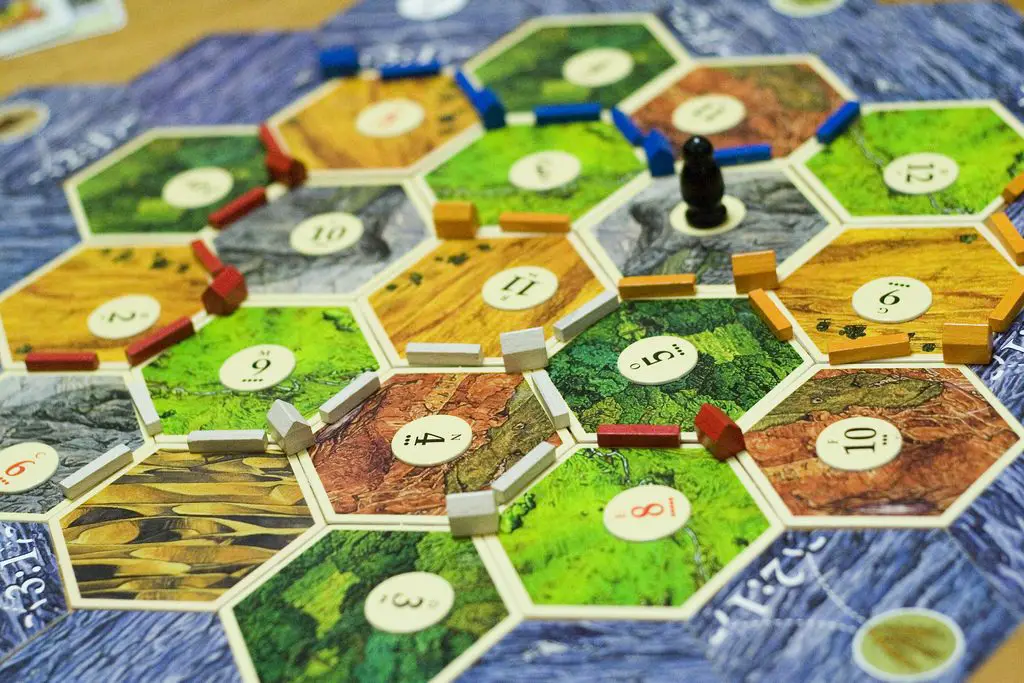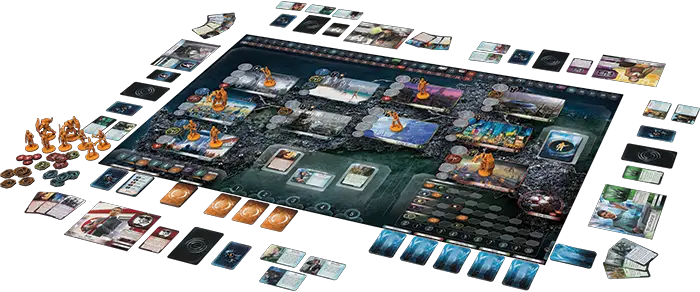You know that one friend of yours who is unnervingly good at lying? The friend who, despite being a good person, is capable of the straight-faced dishonesty and rationalization we associate with politicians and serial killers? Maybe you have more than one of these friends or maybe you are that friend in the group, but either way, you all eventually come to the same conclusion that most people don’t have time to become serial killers. Instead, I recommend finding a healthier outlet for your thirst for manipulation: games.
Card/board games with aspects of betrayal and bluffing built into their framework are ideal for a group hang-out when you are around such people. The social aspect of each of these games acts as its engine, fueling changes in strategies, alliances and sometimes even the rules of the game with each shift in the social dynamic. Focusing on the social aspects of strategy results in games that are as fun and dynamic as the people you play it with.
They are ordered here from least amount of necessary deception to most. To learn more, check out this list of board games.
4. Settlers of Catan
Players: 3-4; Average Game Time: 1-2 hours

Catan is a board game that was originally developed in Europe before rising to popularity around the world. Your mission: to score ten “victory points” by building settlements, cities and the roads that connect them. There is a certain element of chance involved, given that a die roll determines who gets what resources every turn, but the game remains strategic above all else. What is also of note is that different players’ agendas don’t inherently contradict each others’. One person may be aiming to build the longest road while another attempts to have the largest army, neither of which directly combat the other as strategies. But when four people are all trying to achieve goals simultaneously, motives begin to clash.
This is where the social aspect of the game comes to the surface and, therefore, where the liars start to flourish. Catan allows for trading. Sometimes you might trade resources with another player. Other times you might trade a resource in exchange for a promise that you won’t place a robber in their territory or some other equivalent promise for future action. Whatever the deal may be, bartering creates dynamics ripe for manipulation. Convincing your friend to take a bad deal so you can advance your own agenda or crush theirs is a fulfilling rush. Likewise, you may want to interrupt a deal going on between other players and dissuade them from making it because 1) you notice your friend being tricked or 2) you want to trick your friend into not taking a good deal.
Then there is the big one: You also don’t have to follow through with your verbal contracts at all. You can double cross anyone at any time. You can take their resources and not trade them back. You can promise not to build a road through someone’s intended path and then do it anyway. But if you reveal yourself to be a liar, you not only make an instant enemy of whoever you lied to, but create significant distrust from other players. Even if you don’t backstab anyone, people might stray away from working with you just because you consistently make shady deals. Impression-management becomes a central part of the strategy. Some people might opt to play the game as honestly as possible, but for others it is a chance to unleash their inner evil.
3. Coup
Players: 2-6; Average Game Time: 15 minutes
Coup is substantially less complicated and less of a time commitment than Catan, but lying is a far more central element of the strategy. At the beginning of each game, every player is handed two character cards (ex. Duke, Assassin). Each character card gives the player a special ability. If you have a duke card you can use your “tax” power to get more money than your opponents, if you have an “Ambassador” card, you can choose to swap your two cards with cards from the deck, etc. When you have enough money, you can choose to “assassinate” another player’s card. When someone’s two character cards are gone, they are eliminated. The last player standing wins.

Here’s where the lying comes in. No one knows which character cards you have in your hand, meaning you can do anything you want until someone challenges you. Let’s say you have two character cards, neither of which are the Duke, but you want to use the Duke’s taxing abilities. You simply say you are a Duke and take the money anyways. If someone calls you on your lie, you must reveal your card. It is now “dead,” as if someone assassinated you. But if someone accuses you of lying and you aren’t lying, the accuser loses a card, and you are free to trade in your revealed card for a new one.
With characters such as the Assassin who can kill players for less money, or the Contessa who can block an assassination attempt, the power of bluffing becomes tremendous. If you don’t lie, you will almost certainly lose because you only have two cards. If you lie poorly, you will surely lose because people will suspect you and expose your bluff.
2. Avalon
Players: 5-10; Average Game Time: 30 minutes
Technically an expansion of the game “The Resistance,” Avalon takes on an entirely new life from its “bare bones” version. It is also worth noting that this game has a very similar core structure to Mafia, (One Night Ultimate) Werewolf, and Secret Hitler. Avalon is, however, my personal favorite iteration of the concept.

Avalon is what’s called a social deduction game. Each set of players is divided into two groups: good and evil. The evil (for the most part) all know who their fellow evil players are. The good players, however, don’t know who is good and who is bad. This means that even though nearly half of the group is evil, everyone has to act like they are good.
In each round, the group must agree on which individual players should go on a “quest” together. Each player on the quest anonymously submits a card, either a “Success” card or a “Fail” card. A single Fail card will ruin a mission. As you may have guessed, the good team needs a positive success-to-failure ratio to win. They must decide who in a group of people insisting they are all there to help is actually sabotaging the quests.
Up to this point, everything I’ve described is included in the original “Resistance” game. What Avalon has over its predecessor is the presence of special characters. For instance, one of the players on the “good” side is always Merlin. Merlin is allowed to know who the evil players are, but is not allowed to reveal the fact that he is Merlin to his comrades. If the evil team can correctly guess who Merlin is, they immediately win.
Another interesting role is Percival, who is allowed to see who Merlin is. Percival can use this knowledge to try to persuade the group to do what the Merlin player thinks is best, but being too obvious can clue the evil team into to who Merlin is, jeopardizing the whole game. Mordrid, on the other hand, is a special evil character that can’t be seen by Merlin, and can more effectively disguise themselves as good.
There are more characters, but the bottom line is this: from the very beginning, the bad guys and the good guys are constantly lying to each, pretending they know less than they do and obscuring their true intentions. It is more than who has the best poker face; it is also about who is able to change their game strategy game to game and who can remember their friends’ past votes or reactions.
Something I like about Avalon more than some of its sister games, such as Mafia, is that there is no player elimination, which not only makes the game more fun for everyone, but results in more complicated and delicate social balances that need to be managed. This one’s a lot of fun if you don’t mind never trusting your friends again.
1. New Angeles
Players: 4-6; Average Game Time: 2-4 hours
This is perhaps the dastardliest game on the list, as well as the most complicated (although Catan is close). Based around the card game world of Net Runner, New Angeles is set in a future dystopia ruled primarily by mega-corporations. Each player controls one of these mega corporations and uses their money and influence to further their own wealth and power.
Every mega corporation is gathered under the pretense of keeping the city stable by reducing Crime, Disease and Unrest. However, every player is only given one goal: to outscore one specific player in the group. As long as your profits exceed theirs, you win (meaning there can be multiple winners). However, there is one player known as “The Federalist” whose job is to collapse the city. They must keep their true motives a secret for an incredibly long time as they plan their betrayal.

What makes this game even more deception-based than games such as Avalon is that there are no real teams even if a lot of the players have a shared goal. You have no team that you are trying to find in order to band together and defeat your enemies. You just have your player to beat, the federalist, and someone out there trying to beat you. Temporary alliances and deals may form, but the game is built on the foundation of betrayal. You have no real friends in this one.
To some people, a game asking them to lie and manipulate their game buddies might sound like a nightmare. But for others, it offers a unique and dynamic type of strategy that constantly evolves because it derives its fun from the personalities of the people you play with.
So if you have been watching too much Dexter and you’re starting to wonder if perhaps serial killing is your secret passion…try games instead. The dark side is welcome here.

















